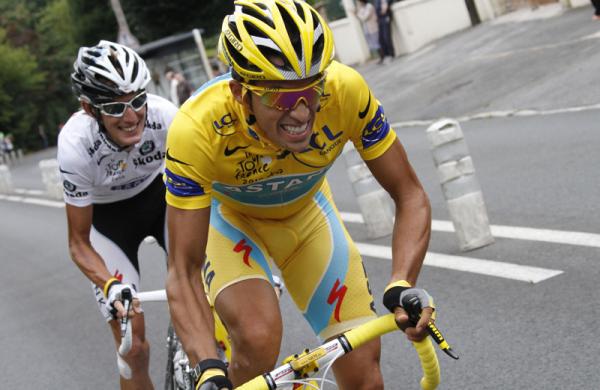Contador's scientific expert De Boer details defense
Says traces of Clenbuterol demonstrate food contamination
The latest race content, interviews, features, reviews and expert buying guides, direct to your inbox!
You are now subscribed
Your newsletter sign-up was successful



The full report from Alberto Contador's scientific expert, Dr. Douwe de Boer, was made public today by the rider's press officer. In it, De Boer details Contador's test results and provides a long list of examples of Clenbuterol contamination in the general population as a result of food contamination.
Alberto Contador tests positive for clenbuterol
Alberto Contador suspended over traces of clenbuterol from Tour de France test
Contador's contaminated food: excuse or possibility?
Contador: Food contamination or political victim?
Contador press conference: Tour de France winner blames food for positive test
Contador announced early on Thursday that he tested positive for the drug on July 21, during the second rest day of the Tour de France. The report gives the concentration of Clenbuterol in the Spaniard's sample as 50 picograms/ml, a value 40 times (not 400 as stated by the UCI) below the value that the laboratory should be able to detect.
De Boer also calls into question the lab's declaring an Adverse Analytical Finding for such a low amount, and argues that 50pg is 180 times less than the amount shown to induce physical effects by the drug.
The report states that Contador showed no traces of the drug on July 19 and 20. After finding 50pg/ml on the 21st, his sample from the next day showed 20pg/ml and then only traces on the following two days.
De Boer is the same expert used by Team RadioShack rider Fuyu Li, who was found positive for Clenbuterol with similar levels to Contador in May.
Clenbuterol, a beta-2 agonist formerly used to treat asthma, is being phased out of human use in favour of safer drugs, but is still used in veterinary applications, especially in livestock, according to the report. Although prohibited in most countries, the drug is used to promote lean muscle growth in livestock, and has been shown to be passed on to humans who consume meat.
"Knowing the history of Clenbuterol intoxications in Spain and knowing the fact that nowadays Clenbuterol can be detected in extremely low amounts, it is obvious that in this particular case the scenario of an accidental intake of Clenbuterol by consumption of meat is extremely likely," the report states.
The latest race content, interviews, features, reviews and expert buying guides, direct to your inbox!
De Boer lists "a small sample" of human "Clenbuterol intoxication" caused by food sources, including one as recent as 2009 in Guangdong, China, although he points that people can be exposed to the drug at low concentrations without any symptoms.
The World Anti-Doping Agency sets no threshold for declaring a positive for Clenbuterol. It only sets a "Minimum Required Performance Level (MRPL)", De Boer stated. Therefore any amount detected can be turned into an Adverse Analytical Finding.
"Therefore, Adverse Analytical Findings for Clenbuterol may result from concentrations below the MRPL even if such concentrations are far below the MPRL. The reason of course is that Clenbuterol may be abused especially during training periods and if testing is performed after such training periods, that Clenbuterol abuse should still be achievable," he said.
Since Contador showed no traces of the drug prior to July 21, and the first detected level was low, De Boer argues that Contador must have ingested the drug at a level of less than 0.1ng/ml and "it is extremely unlikely that such maximum concentrations resulted in any pharmacological effects," he said.
He suggests that WADA-accredited laboratories should not report Clenbuterol levels which are below 1/10th of the MRPL (ie. 200pg or four-times Contador's level) as a way to avoid excessive doping positives as a result of food contamination.

Laura Weislo has been with Cyclingnews since 2006 after making a switch from a career in science. As Managing Editor, she coordinates coverage for North American events and global news. As former elite-level road racer who dabbled in cyclo-cross and track, Laura has a passion for all three disciplines. When not working she likes to go camping and explore lesser traveled roads, paths and gravel tracks. Laura specialises in covering doping, anti-doping, UCI governance and performing data analysis.
